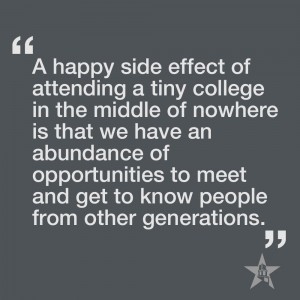After four years at this college, I have heard my share of depreciating remarks about the “Houghton bubble.” We’re a geographical bubble. A religious bubble. Perhaps a socio-economic bubble, and sometimes even a racial bubble. And none of these bubbles are bubbles you want to live in, since living in a bubble means residing in a state of relative ignorance and naiveté, cut off from the rest of civilization in a more-or-less pathetic way. People who live in bubbles are clueless. They make sweeping and misdirected assumptions about the world outside their bubble. They don’t get it. Now, to be frank, I’m not so sure that Houghton is a bubble. At least, Houghton doesn’t have to be a bubble for anyone. However, this doesn’t mean that we’re not in danger of slipping into bubble life, at certain points.
 Here is a kind of bubble that you may not have thought about before: generational bubbles. College students, perhaps more than any other demographic, live in a generational bubble, since to be a residential college student is to live entirely among one’s peer group. We share rooms with our peers. We eat with, attend class with, study with, and hang out with them. We are constantly around others our age. But isn’t that the point? It’s the “best” age group and a high concentration of the age group to boot. No wonder your college years are the “best” time of your life!
Here is a kind of bubble that you may not have thought about before: generational bubbles. College students, perhaps more than any other demographic, live in a generational bubble, since to be a residential college student is to live entirely among one’s peer group. We share rooms with our peers. We eat with, attend class with, study with, and hang out with them. We are constantly around others our age. But isn’t that the point? It’s the “best” age group and a high concentration of the age group to boot. No wonder your college years are the “best” time of your life!
This is bubble thinking at its worst. College students are not self-sufficient unto their own age group. We need friendships with those from other generations, whether younger or older. In part, we need these relationships in order to counteract bubble life. Being friends with people who are younger or older helps us to get outside of ourselves and remember that non-college students have lives and worries too. Getting to know empty nesters, for instance, offers us insight into the lives of our own parents. Meeting the parents of young children makes us feel embarrassed about our own pretense to busyness and sleep-deprivation. Interacting with the children themselves is, usually, plain-old delightful.
Moreover, although we toss around phrases like “older and wiser” with carelessness, there is truth to the idea. We ought to treat experience with living as something of great value, and accordingly, we should seek out those from older generations. Furthermore, we ought to put the experience of these people to use by asking for advice, in mundane and deep matters both. In some cases, we will reject the advice upon reflection, but the practice of asking for advice is still a helpful one, since we practice not-knowing-it-all when we ask for advice. Additionally, when we find ourselves returning repeatedly to a particular person for advice, we form a mentoring relationship. Or, as I like to think of it, a well-established mentor relationship is a kind of apprenticeship, in which the skill being learned is how to live well.
Thankfully, Houghton students are well positioned to counteract the generational bubble. A happy side effect of attending a tiny college in the middle of nowhere is that we have an abundance of opportunities to meet and get to know people from other generations. Our professors are an obvious starting point, as are Houghton’s staff members. Churches, bible studies, and small groups are another good place to look. But, regardless of how we counteract the bubble, this much is clear to me: there is more to life than being a college student. Interacting with other generations will help us remember this.
